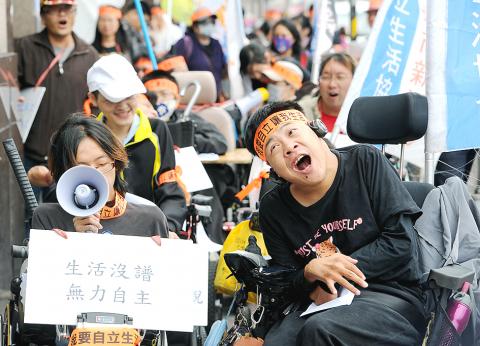A pilot project that offers two-hours-per-day support services to help people with disabilities lead independent lives is extremely unreasonable, the Independent Living Association Taipei said yesterday at a march demanding the attention of the Ministry of Health and Welfare.
The protest march, which was joined by dozens of groups advocating independent living for people with disabilities, ended at the ministry building and was followed by a sit-in on the premises.
Before embarking on the march, the groups enacted a sarcastic skit to show the absurdity of the government project which proclaims to help people with disabilities “obtain independence.”

Photo: Liao Chen-huei, Taipei Times
In the skit, the “personal assistant,” who according to the project is to provide 60 hours of support services per month to persons with severe disabilities and 30 hours per month to those with moderate disabilities, rushed his services, with the narrator hurrying him along in order to “save national resources.”
The support service pilot project was initiated last year after the People with Disabilities Rights Protection Act (身心障礙者權益保障法), which had cleared the legislature in 2011, was amended to include support services for independent living as a type of home service, to be provided by the competent authority. The project has been providing a “personal assistant” service that aims to assist people with disabilities to achieve independent living and broaden their social participation in their communities.
“However, [the project] overlooks each disabled person’s individual needs and neglects the voice of users of the service, resulting in providing unrealistic services that fail to meet users’ needs and only serves the government’s control of resources,” the association said in a statement.
Independent Living Association Taipei secretary-general Lin Chun-chieh (林君潔) said the cap on the service hours “has resulted in local authorities’ reluctance to provide further assistance and services to people who need them.”
“The service should be provided according to each person’s needs,” she added.
The association also faulted the government for paying personal assistants — who perform heavy and exhausting work — an hourly wage of NT$120, “which is much lower than the NT$180 that in-home caregivers get and the NT$150 paid to temporary babysitters.”
Liu Che-chang (劉哲彰), a board member of the association, said that people with moderate or severe disabilities staying in institutions are “trapped,” sometimes force-fed and confined to their beds for long periods of time.
“Their lives can be likened to those of domestic animals,” Liu said.
Many of the institutionalized are hoping to leave the institutions and to be supported by independent living services, the association said, adding that the government should invite people with disabilities to help design the project in order to come up with a bottom-up, rather than the present top-down, approach to the development of tailor-made support services.

NUMBERS IMBALANCE: More than 4 million Taiwanese have visited China this year, while only about half a million Chinese have visited here Beijing has yet to respond to Taiwan’s requests for negotiation over matters related to the recovery of cross-strait tourism, the Tourism Administration said yesterday. Taiwan’s tourism authority issued the statement after Chinese-language daily the China Times reported yesterday that the government’s policy of banning group tours to China does not stop Taiwanese from visiting the country. As of October, more than 4.2 million had traveled to China this year, exceeding last year. Beijing estimated the number of Taiwanese tourists in China could reach 4.5 million this year. By contrast, only 500,000 Chinese tourists are expected in Taiwan, the report said. The report

SHIPS, TRAINS AND AUTOMOBILES: The ministry has announced changes to varied transportation industries taking effect soon, with a number of effects for passengers Beginning next month, the post office is canceling signature upon delivery and written inquiry services for international registered small packets in accordance with the new policy of the Universal Postal Union, the Ministry of Transportation and Communications said yesterday. The new policy does not apply to packets that are to be delivered to China, the ministry said. Senders of international registered small packets would receive a NT$10 rebate on postage if the packets are sent from Jan. 1 to March 31, it added. The ministry said that three other policies are also scheduled to take effect next month. International cruise ship operators

Temperatures are forecast to drop steadily as a continental cold air mass moves across Taiwan, with some areas also likely to see heavy rainfall, the Central Weather Administration (CWA) said. From today through early tomorrow, a cold air mass would keep temperatures low across central and northern Taiwan, and the eastern half of Taiwan proper, with isolated brief showers forecast along Keelung’s north coast, Taipei and New Taipei City’s mountainous areas and eastern Taiwan, it said. Lows of 11°C to 15°C are forecast in central and northern Taiwan, Yilan County, and the outlying Kinmen and Lienchiang (Matsu) counties, and 14°C to 17°C

STEERING FAILURE: The first boat of its class is experiencing teething issues as it readies for acceptance by the navy, according to a recent story about rudder failure The Hai Kun (海鯤), the nation’s first locally built submarine, allegedly suffered a total failure of stern hydraulic systems during the second round of sea acceptance trials on June 26, and sailors were forced to manually operate the X-rudder to turn the submarine and return to port, news Web site Mirror Daily reported yesterday. The report said that tugboats following the Hai Kun assisted the submarine in avoiding collisions with other ships due to the X-rudder malfunctioning. At the time of the report, the submarine had completed its trials and was scheduled to begin diving and surfacing tests in shallow areas. The X-rudder,